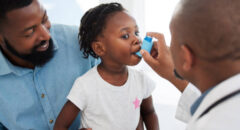 In recent weeks, more than 1000 children have been sickened – some hospitalized – by a yet-to-be confirmed respiratory illness and doctors believe the virus could spread nationwide. Good Morning America reports that outbreaks of the disease have been seen in 10 states: Colorado, Georgia, Illinois, Iowa, Kansas, Kentucky, Missouri, North Carolina, Ohio and Oklahoma.
In recent weeks, more than 1000 children have been sickened – some hospitalized – by a yet-to-be confirmed respiratory illness and doctors believe the virus could spread nationwide. Good Morning America reports that outbreaks of the disease have been seen in 10 states: Colorado, Georgia, Illinois, Iowa, Kansas, Kentucky, Missouri, North Carolina, Ohio and Oklahoma.
Officials believe the disease is a rare and potentially fatal respiratory virus called human enteriovirus 68 and according to the Centers for Disease Control (CDC) it is in the same family as the rhinovirus which causes the common cold.
“This is a very common time for outbreaks. Kids come back to school, they like to share things, they bring them home to their little brothers and sisters, and enteroviruses tend to occur in the summer,” ABC News Chief Health and Medical Editor Dr. Richard Besser said. “But this one, this particular Enterovirus 68, is very rare and they have no idea why it showed up this year.”
Children under the age of five are most susceptible to the virus.
SIGN UP FOR OUR NEWSLETTER HERE!
Similar to the common cold, symptoms of enterovirus 68 include:
- Runny nose
- Coughing
- Sneezing
- Fever
However, this particular virus can quickly progress to more severe symptoms, including difficulty breathing and loss of consciousness. For children with asthma, contracting the virus is especially dangerous, causing wheezing and bringing on seasonal allergies.
The Asthma and Allergy Foundation of America cites that nearly 5 million asthma sufferers are under age 18. It is the most common chronic childhood disease, affecting more than one child in 20. Overall, African Americans are three times more likely to be hospitalized from asthma and three times more likely to die from asthma.
FDA Warning: Teething Medications Deadly In Infants
As this story continues to unfold, the CDC recommends that parents encourage and supervise their child’s handwashing. Children should also cover their nose and mouth when they sneeze or cough, and avoid anyone that is sick.
If your child has asthma, make sure their inhaler is easily accessible at all times and that teachers and other caregivers know the action plan if the child begins wheezing or has an asthma attack.
Visit the BlackDoctor.org Asthma for Kids center for more articles.








